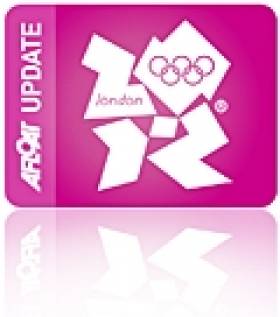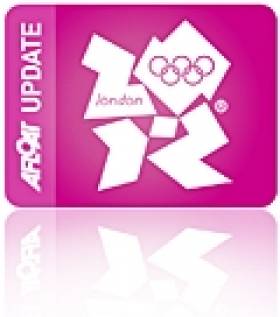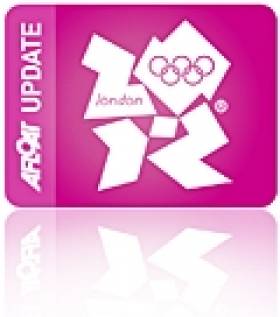Displaying items by tag: 49er Europeans
Dickson and Waddilove Secure Their Paris 2024 Spot as Guilfoyle and Durcan Are Denied Chance to Close the Gap
Robert Dickson and Seán Waddilove have emerged best of the two Irish contenders to compete in the men’s skiff event at Paris 2024 this summer.
The Dublin crew — from Howth Yacht Club and Skerries Sailing Club respectively — qualified for the medal race final in eighth overall at the 49er European Championships in La Grande Motte, France on Sunday 12 May, the third and final event of the selection trials.
Their rivals for the place, Séafra Guilfoyle and Johnny Durcan, delivered an outstanding performance of their own over the past six days, finishing in 12th place — their personal best result as a pair — and within striking distance of taking the place.
But the Royal Cork Yacht Club pair were denied a final chance at closing the gap on Dickson and Waddilove when light winds forced their final fleet race to be cancelled on Sunday despite two attempts to go afloat hoping for breeze.
Light winds were also threatening the possibility of the medal race on Sunday afternoon, though the best that the Dublin crew can achieve is sixth overall in a fleet that comprises the best sailors in the world that will all be competing in the Olympics.
Dickson and Waddilove competed for Ireland at Tokyo 2020 for their first Olympic appearance and qualified Ireland for this year’s games at the 2023 Europeans in Portugal last November.
This selection marks the conclusion of a 45-race series which took place over three regattas.
It’s expected the nomination will be ratified by the Olympic Federation of Ireland in the coming weeks when Dickson and Waddilove join Eve McMahon (Howth Yacht Club) and Finn Lynch (National Yacht Club) in their respective one-person dinghy events for Team Ireland.
La Grande Motte International Regatta 2024 Marks Final Dress Rehearsal for Cats and Skiffs Before Paris 2024
The Nacra 17 World Championship along with the 49er and 49erFX European Championships are attracting 148 teams to La Grande Motte in the south of France for six days of racing from next Tuesday 7 to Sunday 12 May.
Of those crews registered, 39 will represent their country in less than three months in Marseille, location of the 2024 Olympics sailing events.
La Grande Motte effectively serves as the final dress rehearsal for the Olympic sailors, a final opportunity to line up on big start lines and experience the hurly-burly of high-traffic mark roundings and tight boat-on-boat tactics.
For some, this event is even important as the regatta is serving as the final part of their national qualification trials.
As previously reported on Afloat.ie, the 49er Europeans is the third and final event in the Irish men’s skiff trials series.
Robert Dickson and Seán Waddilove (Howth YC/Skerries SC) hold a tiny five-point advantage over Crosshaven's Séafra Guilfoyle and Johnny Durcan, meaning the Royal Cork crew must beat the Dublin duo by five places and finish within the top 20 to win a place with Team Ireland for Paris 2024.
It will be far from an easy task. La Grande Motte’s organisers have remarked on how interesting it’s been to see how some of the teams that missed out on Olympic selection have been performing at such a high level in recent weeks.
“Perhaps with the pressure off, they’ve been able to sail with more freedom,” they say. “We can expect to see some of those ‘non-Olympic’ crews to be challenging hard for the podium. Because, after all, this is not just a warm-up for Marseille but a big deal in its own right.”
La Grande Motte International Regatta 2024 programme:
- 4-6 May: Boat inspection and registration confirmation
- 6 May: Official training regattas and opening ceremony
- 7-11 May: Qualifying regattas: 3 races per day and per series (weather permitting); daily race numbers for the top three provisional finishers in the three series
- 12 May: Medal Races — 10-boat finals, followed by medal ceremony
Fifth in Silver for Irish 49er
Fifth place in the silver fleet was the best that the Irish 49ers could offer at the European Championships in Poland, which ended this weekend. British team Chris Draper and Peter Greenhalgh came out the winners after a medal race that was held close to shore and thousands of spectators on a packed beach.
Ryan Seaton and Matt McGovern, Ireland's top contenders for an Olympic slot in the 49er, finished the event in inauspicious circumstances, with a 23rd and a black flag.
Results are HERE, and it's a pity that the one spectator- and camera-friendly fleet in the Olympics couldn't get it together with a decent web presence for one of the biggest events on their calendar.
Silver Fleet for Irish 49er
Winds of up to 20 knots near Gdansk in Poland tested 49er crews at the European Championships yesterday as the fleet neared the split for silver and gold.
Top Irish team Ryan Seaton and Matt McGovern improved on their 38th overall standing, but couldn't make the top 25. With a further BFD on their scorecard, they now sit in 8th position in the Silver Fleet going into the final two days of racing. There's no gradient breeze to speak of forecast for the lads today, but with high temperatures, a solid sea breeze could be on the cards.
Ed Butler and Ben Lynch are fourth in the bronze fleet, with Marcus Spillane and Amish Ved in 23rd.
Pietro and Gianmarco Sibello won both races yesterday to propel them to the top but with only a one- point lead over British sailors Stevie Morrison and Ben Rhodes. Chris Draper and Peter Greenhalgh are another single point adrift in third.
Event website is HERE.
Slow Start for 49ers in Poland
Ireland's 49er crews have a long way to go if they are to qualify for the gold fleet in the European Championships, being held in Gdynia, Poland.
Olympic campaigners Ryan Seaton and Matt McGovern are top Irish at the moment, but in 52nd of 82 boats, they are still some way off the gold standard, with just 25 boats going through into the gold fleet.
Class chairman Marcus Spillane, sailing with Amish Ved, is in 67th, with Ed Butler and Ben Lynch in 78th overall.
Results are HERE.
































































